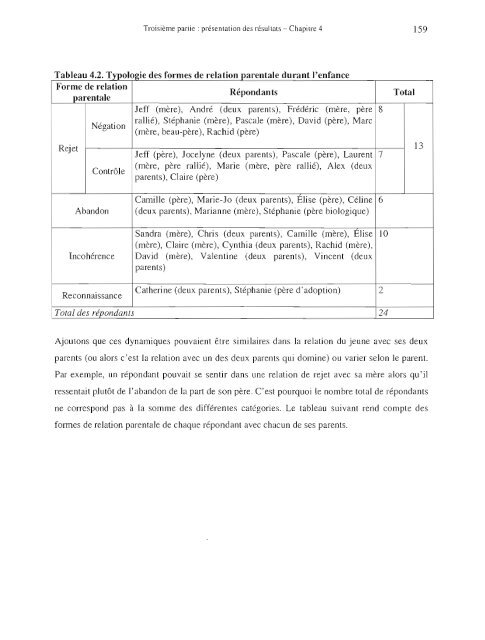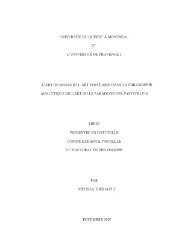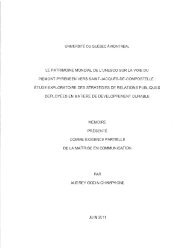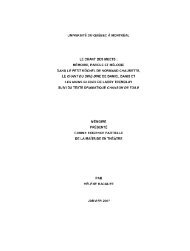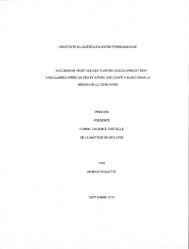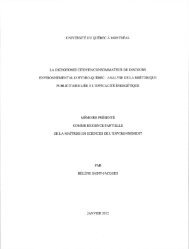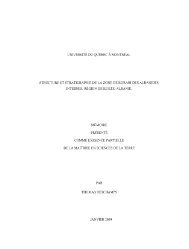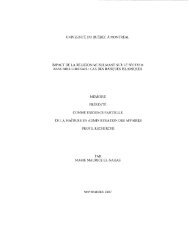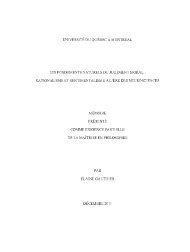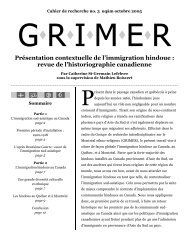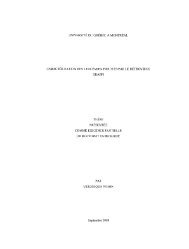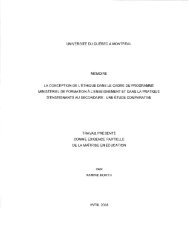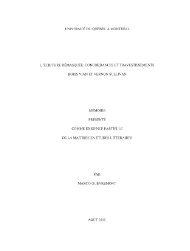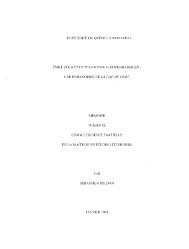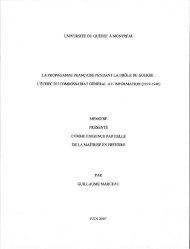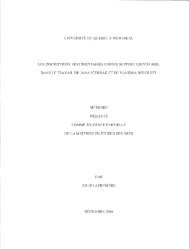- Page 1 and 2:
UNIVERSITÉ DU QUÉBEC À MONTRÉAL
- Page 3 and 4:
REMERCIEMENTS Je tiens tout d'abord
- Page 5 and 6:
DEUXIÈME PARTIE: REPÈRES MÉTHODO
- Page 7 and 8:
ANNEXE 7 : LISTE DES ORGANISMES DES
- Page 9 and 10:
LISTE DES FIGURES Figure 2.1. Le do
- Page 11 and 12:
manifeste sous forme de négation o
- Page 13 and 14:
Introduction générale Parler de s
- Page 15 and 16:
Introduction générale Ce ne sont
- Page 18 and 19:
Introduction générale LA TROISIÈ
- Page 20 and 21:
Introduction générale compréhens
- Page 22 and 23:
PREMIÈRE PARTIE : PROPOSITION THÉ
- Page 24 and 25:
Introduction CHAPITRE 1. REVUE DE L
- Page 26 and 27:
Première partie: proposition théo
- Page 28 and 29:
Première partie: proposition théo
- Page 30 and 31:
Première partie: proposition théo
- Page 32 and 33:
Première partie: proposition théo
- Page 34 and 35:
Première partie: proposition théo
- Page 36 and 37:
Première partie: proposition théo
- Page 38 and 39:
Première partie: proposition théo
- Page 40 and 41:
Première partie: proposition théo
- Page 42 and 43:
Première panie : proposition théo
- Page 44 and 45:
Première partie: proposition théo
- Page 46 and 47:
Première partie: proposition théo
- Page 48 and 49:
Première panie : proposition théo
- Page 50 and 51:
Première part ie : proposition th
- Page 52 and 53:
Première partie: proposition théo
- Page 54 and 55:
Première partie: proposition théo
- Page 56 and 57:
Première partie: proposition lhéO
- Page 58 and 59:
Première partie: proposition théo
- Page 60 and 61:
Première partie: proposition théo
- Page 62 and 63:
Première partie: proposition théo
- Page 64 and 65:
Première partie: proposition théo
- Page 66 and 67:
Première parlie : proposition thé
- Page 68 and 69:
Première partie: proposition théo
- Page 70 and 71:
Première partie: proposition théo
- Page 72 and 73:
Première partie: proposition théo
- Page 74 and 75:
Première panie : proposition théo
- Page 77 and 78:
Première partie: proposition théo
- Page 79 and 80:
Première partie: proposition théo
- Page 81 and 82:
2.1.1. Identité Première panie :
- Page 83 and 84:
Première partie: proposition théo
- Page 85 and 86:
Première parlie : proposilion thé
- Page 88 and 89:
Première pnrtie : proposition thé
- Page 90 and 91:
Première partie: proposition théo
- Page 92 and 93:
Première partie: proposition théo
- Page 94 and 95:
Première partie: proposition théo
- Page 96 and 97:
Première partie: proposition théo
- Page 99 and 100:
Première partie: proposition théo
- Page 101 and 102:
Première panie : proposilion théo
- Page 103 and 104:
Première partie: proposition théo
- Page 105 and 106:
Première partie: proposition théo
- Page 107 and 108:
L'appropriation Première partie: p
- Page 109 and 110:
Première partie: proposition théo
- Page 111 and 112:
Première parlie : proposition thé
- Page 113 and 114:
Première partie: proposilion théo
- Page 115 and 116:
Première partie: proposition théo
- Page 117 and 118:
Première partie: proposition théo
- Page 119 and 120: Première partie: proposition théo
- Page 122 and 123: Première partie: proposition théo
- Page 124 and 125: Première partie: proposition théo
- Page 126 and 127: Première partie: proposition théo
- Page 128 and 129: 2.3.2. Contextes relationnels Premi
- Page 131 and 132: Première partie: proposition théo
- Page 133 and 134: CONCLUSION, HYPOTHÈSE ET OBJECTIF
- Page 135 and 136: DEUXIÈME PARTIE : REPÈRES MÉTHOD
- Page 137 and 138: Deuxième partie: repères méthodo
- Page 139 and 140: Deuxième partie: repères méthodo
- Page 141 and 142: Deuxième partie: repères mélhodo
- Page 144: Deuxième partie: repères méthodo
- Page 147 and 148: Deuxième partie: repères méthodo
- Page 149 and 150: Deuxième panie : repères méthodo
- Page 151 and 152: Deuxième partie: repères méthodo
- Page 153 and 154: 1 Objectif 1 Objectif Deuxième par
- Page 155 and 156: Deuxième partie: repères méthodo
- Page 157 and 158: Deuxième partie: repères méthodo
- Page 159 and 160: Deuxième partie: repères méthodo
- Page 161 and 162: Troisième partie: présentation de
- Page 163 and 164: Troisième partie: présentation de
- Page 165 and 166: Troisième partie: présentation de
- Page 167 and 168: Troisième panie : présentation de
- Page 169: Troisième panie : présentation de
- Page 173 and 174: Troisième partie: présentation de
- Page 175 and 176: Troisième partie: présentation de
- Page 178 and 179: Troisième partie: présentation de
- Page 180 and 181: Troisième partie: présentation de
- Page 182 and 183: Deuxième partie: repères méthodo
- Page 184 and 185: Deuxième partie: repères méthodo
- Page 186 and 187: Deuxième partie: repères méthodo
- Page 188 and 189: INTRODUCTION Fait que je me suis re
- Page 191 and 192: Troisième partie: présentation de
- Page 193 and 194: Troisième partie: présentation de
- Page 195 and 196: Troisième partie: présentation de
- Page 197 and 198: Troisième panie : présent
- Page 199 and 200: Troisième partie: présentation de
- Page 201 and 202: Contexles relalionnels sociaux Troi
- Page 204 and 205: Troisième partie: présentation de
- Page 206 and 207: Troisième partie: présentation de
- Page 208 and 209: Troisième panie : présenlation de
- Page 210 and 211: Troisième partie: présentation de
- Page 212 and 213: CHAPITRE 5. RELATIONS PARENTALES DE
- Page 214 and 215: Troisième pélrtie : présentation
- Page 216 and 217: Troisième partie: présentation de
- Page 218 and 219: Troisième p
- Page 220 and 221:
Troisième partie: présentation de
- Page 222 and 223:
Troisième partie: présentation de
- Page 224 and 225:
Troisième panie : présentation de
- Page 227 and 228:
Troisième panie : présentation de
- Page 229:
Troisième partie: présentation de
- Page 232 and 233:
Troisième partie: présentation de
- Page 236 and 237:
Troisième partie: présentation de
- Page 238 and 239:
Troisième partie: présentation de
- Page 240 and 241:
Troisième partie: présentation de
- Page 242 and 243:
Troisième partie :présenlalion de
- Page 244 and 245:
Troisième partie: présentation de
- Page 246 and 247:
Troisième partie: présentation de
- Page 248 and 249:
Troisième partie: présentaiion de
- Page 250 and 251:
Troisième partie: présentation de
- Page 252:
Troisième panie : présentation de
- Page 255 and 256:
Troisième partie: présentation de
- Page 257 and 258:
Troisième partie: présentation de
- Page 259 and 260:
Troisième partie: présentation de
- Page 261 and 262:
es résultaIs - Chapilre 5 On retro
- Page 263 and 264:
Troisième partie: présentation de
- Page 265 and 266:
Troisième partie: présentat ion d
- Page 267 and 268:
Troisième partie: présentation de
- Page 269 and 270:
Troisième partie: présentation de
- Page 271 and 272:
Troisième partie: présentation de
- Page 273 and 274:
Troisième partie: présentation de
- Page 275 and 276:
Troisième partie: présentation de
- Page 277 and 278:
Troisième partie: présentation de
- Page 279 and 280:
Troisième panie : présentation de
- Page 281 and 282:
Troisième partie: présentation de
- Page 283 and 284:
Troisième panie : présentation de
- Page 285:
Troisième panie : présentation de
- Page 289 and 290:
Troisième partie: présentai ion d
- Page 291 and 292:
Troisième partie: présentation de
- Page 293 and 294:
Troisième partie: présentation de
- Page 295 and 296:
Troisième partie: présentation de
- Page 297 and 298:
Troisième partie: présenlation de
- Page 299 and 300:
Troisième partie: présentation de
- Page 301 and 302:
Troisième partie: présentation de
- Page 303 and 304:
Troisième partie: présentation de
- Page 305 and 306:
Troisième partie: présenlation de
- Page 307:
Troisième partie: présentation de
- Page 310 and 311:
Troisième partie: présentation de
- Page 312 and 313:
Troisième partie: présentation de
- Page 314 and 315:
Troisième partie: présentation de
- Page 316:
Troisième partie: présentation de
- Page 319 and 320:
Troisième partie: présentation de
- Page 321 and 322:
Troisième partie: présentation de
- Page 323 and 324:
Troisième partie: présentation de
- Page 325 and 326:
Troisième pnnie : présenlnlion de
- Page 327 and 328:
Troisième parlie : présentation d
- Page 329 and 330:
Troisième partie: présenlation de
- Page 331 and 332:
Troisième partie: présentation de
- Page 333 and 334:
Troisième partie: présentation de
- Page 335:
Troisième partie: présentation de
- Page 338 and 339:
Troisième partie: présentation de
- Page 340 and 341:
Troisième partie: présentation de
- Page 342 and 343:
Troisième panie : présentation de
- Page 344 and 345:
Troisième partie: présentation de
- Page 346 and 347:
CHAPITRE 6. RELATIONS PARENTALES D'
- Page 348:
Troisième partie: présentation de
- Page 351 and 352:
Troisième partie: présentaI ion d
- Page 353 and 354:
Troisième partie: présentation de
- Page 355 and 356:
Troisième partie: présentation de
- Page 357 and 358:
Troisième parlie : présentation d
- Page 359 and 360:
Troisième parlie : présenlation d
- Page 361 and 362:
Troisième partie: présentation de
- Page 363 and 364:
Troisième partie: présentation de
- Page 365:
Troisième partie: présentation de
- Page 368 and 369:
Troisième parlie : présentation d
- Page 370 and 371:
Troisième parlie : présentation d
- Page 372 and 373:
Troisième partie: présentation de
- Page 375:
Troisième pnrtie : présentation d
- Page 378 and 379:
Troisième partie: présentation de
- Page 380 and 381:
Troisième partie. présentation de
- Page 382 and 383:
Troisième partie: présenlation de
- Page 384:
Troisième partie: présenlalion de
- Page 387 and 388:
Troisième partie: présentation de
- Page 389 and 390:
Troisième partie: présentation de
- Page 391 and 392:
Troisième partie: présentation de
- Page 393 and 394:
Troisième parlie : présentation d
- Page 395 and 396:
Troisième partie: présentation de
- Page 397 and 398:
Troisième partie: présentation de
- Page 399 and 400:
Troisième partie: présentation de
- Page 401 and 402:
Troisième partie: présentation de
- Page 403 and 404:
Troisième partie: présentation de
- Page 405 and 406:
Troisième partie: présentation de
- Page 407 and 408:
Troisième partie: présentation de
- Page 409 and 410:
Troisième partie: présentation de
- Page 411:
Troisième partie: présentation de
- Page 414 and 415:
Troisième panie : présentation de
- Page 416 and 417:
Troisième panie : présentation de
- Page 418 and 419:
Troisième partie: présentation de
- Page 420 and 421:
Troisième partie: présentation de
- Page 423 and 424:
Troisième partie: présentation de
- Page 425:
Troisième partie: présentation de
- Page 428:
Troisième partie: présentation de
- Page 431 and 432:
Troisième partie: présentation de
- Page 433 and 434:
Troisième partie: présentation de
- Page 435 and 436:
Troisième partie: présentai ion d
- Page 437 and 438:
Troisième partie: présentation de
- Page 439:
Troisième partie: présentation de
- Page 442 and 443:
Troisième parlie : présentation d
- Page 444 and 445:
Troisième partie: présentation de
- Page 447:
Troisième partie: présentation de
- Page 450 and 451:
Troisième partie: présenlation de
- Page 452 and 453:
Troisième partie: présentation de
- Page 454 and 455:
Troisième partie: présentation de
- Page 456 and 457:
Troisième partie: présenlation de
- Page 458 and 459:
Troisième partie: présentation de
- Page 460 and 461:
Troisième partie: présentation de
- Page 462 and 463:
Troisième partie: présentation de
- Page 464 and 465:
Troisième partie: présentation de
- Page 466 and 467:
Troisième partie: présentation de
- Page 468 and 469:
Troisième panie: présentation des
- Page 470 and 471:
Troisième partie: présentation de
- Page 472 and 473:
Troisième partie: présentation de
- Page 475:
Troisième partie: présentation de
- Page 478 and 479:
Troisième partie: présentation de
- Page 482 and 483:
Troisième partie: présentation de
- Page 484 and 485:
Troisième partie: présentation de
- Page 486 and 487:
Troisième partie: présentation de
- Page 488 and 489:
Troisième partie: présentation de
- Page 490 and 491:
Troisième partie: présentalion de
- Page 493 and 494:
Conclusion Troisième partie: prés
- Page 495 and 496:
Troisième partie: présenlation de
- Page 497 and 498:
Troisième partie: présentation de
- Page 501 and 502:
Troisième partie: présentation de
- Page 503 and 504:
Troisième partie: présentation de
- Page 505 and 506:
CONCLUSION GÉNÉRALE
- Page 507 and 508:
Conclusion générale de reposition
- Page 509 and 510:
Conclusion générale consciente de
- Page 511 and 512:
Conclusion générale Sur le plan m
- Page 513 and 514:
Conclusion générale sortie? Est-c
- Page 515 and 516:
Conclusion générale des modalité
- Page 517 and 518:
Conclusion générale conditions mi
- Page 519 and 520:
Conclusion générale y déceler un
- Page 521 and 522:
Conclusion générale Enfin, l'anal
- Page 523 and 524:
Conclusion générale C'est un myth
- Page 525 and 526:
Conclusion générale part» et de
- Page 527 and 528:
Conclusion générale la sortie de
- Page 529 and 530:
Conclusion générale actuelles, br
- Page 531 and 532:
Conclusion générale Ces résultat
- Page 534 and 535:
Conclusion générale personnels. l
- Page 536 and 537:
BIBLIOGRAPHIE
- Page 538 and 539:
Bibliographie 527 Bard, Y. 1987. La
- Page 540 and 541:
Bibl iographie 529 Charbonneau, J.
- Page 542 and 543:
Bibliographie 531 Dorais, M et S.L.
- Page 544 and 545:
Bibliographie 533 transgénération
- Page 546 and 547:
Annexes 535 négation: se sont sent
- Page 548 and 549:
Annexes 537 10. Il se peut aussi qu
- Page 550 and 551:
Nom: _ ANNEXES: QUESTIONNAIRE DISTR
- Page 552 and 553:
Annexes 541 avoir opéré une redé
- Page 554 and 555:
Annexes 543 6. Il en va de même po
- Page 556 and 557:
Annexes 545 9. Enfin, un dernier po
- Page 558 and 559:
Relais Méthadone: CRAN (Centre de
- Page 560 and 561:
-. 2004. Le petit Larousse. Paris:
- Page 562 and 563:
Bibliographie 551 Blanchet, A. et A
- Page 564 and 565:
Bibliographie 553 Colombo, A et A.
- Page 566:
Bibliographie 555 Franssen, A. 1997
- Page 569 and 570:
Follow-Up ». Youth & Society, 37,4
- Page 571 and 572:
Homeless Laws in the United States
- Page 573 and 574:
Bibliographie 562 Poirier, M., Luss
- Page 575 and 576:
Bibliographie 564 Stettinger, V. 20


